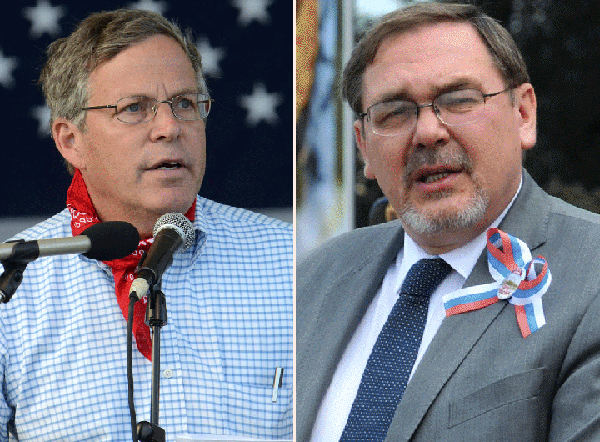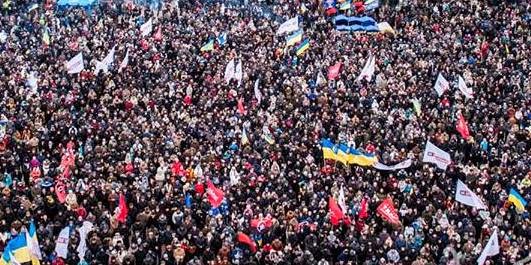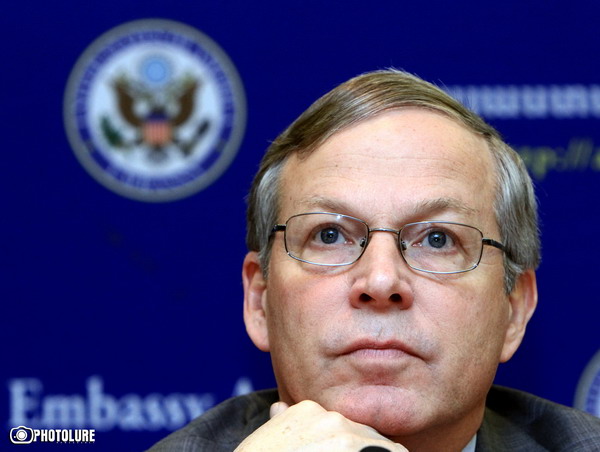Most interesting are the real objectives of the United States and the Russian governments
The activities of accredited ambassadors in Armenia and their public statements from time to time become a cause for heated debates. Mass media of different fields, expertise circles and public groups are engaged in criticizing on the internet this-or-that statement by ambassadors. It has been a few days since the topic of the U.S. Ambassador Extraordinary and Plenipotentiary to Armenia, John Heffern, is criticized. Weeks ago, the U.S. ambassador to Baku was “attacked” in Azerbaijan, and especially pro-Russian officials in Azerbaijan were engaged in “putting him in the pillory” since the moment when Richard Morningstar had said, “If the government holds a harder line against civil society, then Maidan events may recur in Baku. If not now, then in 5-10 years.” Nagorno-Karabakh conflict is especially sensitive to us. In the interview to News.am, the U.S. ambassador to Armenia spoke on Nagorno-Karabakh conflict and mentioned that he considers the return of Nagorno-Karabakh surrounding areas one of the six elements of conflict settlement (he did not say anything new). The ambassador detailed that he does not mean that Nagorno-Karabakh surrounding areas should be returned to Azerbaijan in the first place. “No, no, it is supposed to be within the final solution of the problem. According to agreed six elements, the final status of Nagorno-Karabakh shall be resolved through free expression of will. Then, Nagorno-Karabakh surrounding areas, with the exception of the Lachin corridor, should be returned.” Heffern also added that some security guarantees are necessary, also the presence of international peacekeeping forces “prior to return of the territories by the Armenian side.” Heffern’s formulation – first referendum, and then “return of territories”, judging by the Azerbaijani sites, is not to the “liking” by Azerbaijanis … The United States has its vision of establishing stability in our region. It has never concealed it, and it is unchanged for a long time: the Armenia-Turkey relations should be normalized, Nagorno-Karabakh conflict should be resolved as quickly as possible, because the status quo is dangerous, and the resumption of hostilities are unacceptable. Both in Armenia and Azerbaijan, the U.S. ambassadors are surely sending targeted messages, and throwing stones for political and public debates. And they are successful in inciting such debates. As representatives of official Washington, they are doing their job. It is required by the administration of the United States, a work from them about the issues in which Washington is interested. What were with Russian ambassadors to Armenia busy with? Several ambassadors are replaced, but for a long time, great part of our society did not even know the names of Russian ambassadors to Armenia, they did not even know them by face. Now, of course, many people know Russian Ambassador to Armenia, Ivan Volinkin. He gained fame a few months ago with a clamorous statement, when he threatened the NGOs in Armenia. “I am sure that Russia should declare its presence in the information sphere of Armenia more actively. There is no doubt about it. In this respect, there is no doubt. However, other methods should be used to neutralize the NGOs that stick a wedge in the Armenian-Russian relations. By the way, Russia has adopted a law, which clearly defines the activities of NGOs. Finally, it is obvious that those who are directing their activities against the Russian-Armenian friendship do not wish good for Russia and Armenia.” Ivan Volinkin did not spoke on Nagorno-Karabakh conflict. But this does not mean that his position regarding the “territories” is different from the position by American ambassadors, and Russian ambassadors are acting more “pro-Armenian” on the Nagorno-Karabakh conflict. At least the stances of Russia’s Foreign Ministers and the OSCE Minsk Group Russian Co-chairs about Karabakh conflict settlement are known, and they also, if the chance was there, have noted that they protect the “territorial integrity of Azerbaijan”. Moscow needs that nothing intimidates the Armenian-Russian “old-aged” friendship, and even the fact that in three years Russia has sold arms to Azerbaijan worth of four billion dollars, of which one billion and more are aggressive weapons, according to the Russians, we should take it normal, as a “business” deal. It is normal that a question arises in the mind of a reasonable person of why RF, being an OSCE Minsk Group co-chair country, which is called to contribute to peacemaking through negotiations, promotes the military strengthening of Azerbaijan, and somehow contributes to the fact that Ilham Aliyev every other day intimidates to destroy Armenia from the world and present the advantages of his country’s armors over Armenia. It is not worthy to like or hate the ambassadors for their statements, it’s meaningless. U.S. Ambassador presents Washington’s stance to our society, the Russian ambassador presents the Kremlin’s stance. Our society should more be interested in the real objectives of the United States’ and Russia’s authorities, which sometimes are reached to us through the stances expressed by the ambassadors.
EMMA GABRIELYAN



























































